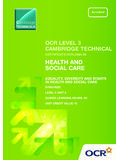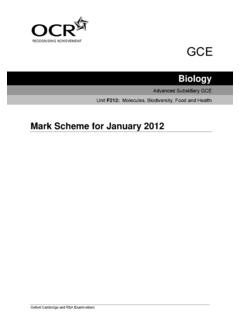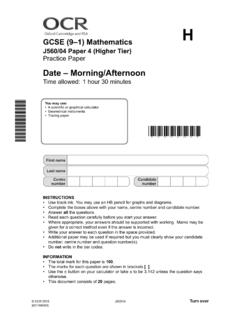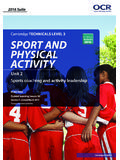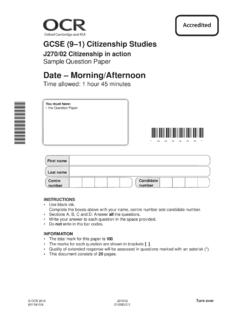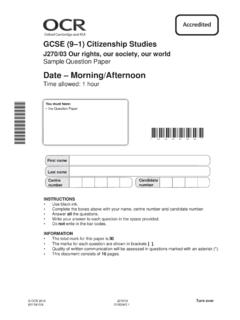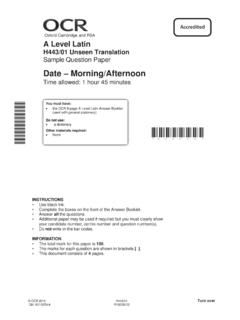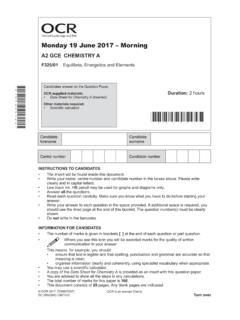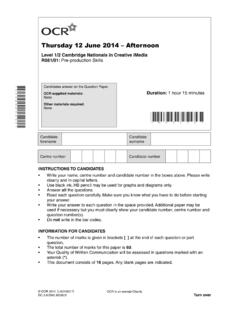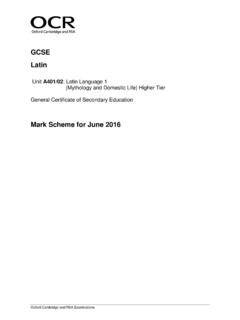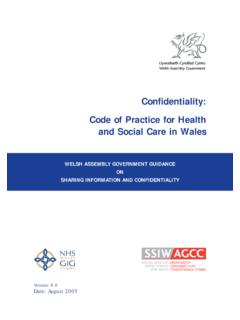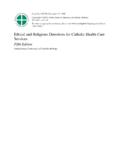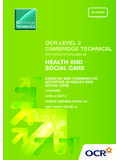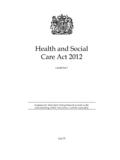Transcription of Cambridge TECHNICALS LEVEL 3 HEALTH AND …
1 1 Building positive relationships in HEALTH and social careY/507/4365 Guided learning hours: 60 Version 4 September 2017 Cambridge TECHNICALS LEVEL 3 HEALTH AND social CARE2016 SuiteFirst teaching September 2016 LEVEL 3 UNIT 1: Building positive relationships in HEALTH and social care Y/507/4365 Guided learning hours: 60 Essential resources required for this unit: For LO3, learners will require case studies of individuals receiving care or support. For LO4, learners will need access to a HEALTH , social care or child care environment and participants for one-to-one and group interactions. This may be simulated. This unit is internally assessed and externally moderated by OCR. UNIT AIM No work in the HEALTH and social care sector is completed in isolation.
2 Professional relationships are paramount to the delivery of safe and effective care and support and an understanding of these relationships, and how they are formed, is essential if you are considering pursuing a career in the HEALTH and social care sector. This unit aims to introduce you to the many different relationships that you will encounter within the HEALTH and social care sector; whether with colleagues, senior members of staff, other professionals within the sector or individuals who require care and support. By doing this unit you will apply communication and relationship building skills in a practical way, considering how different factors, including context, can impact on the building of positive relationships. You will also be introduced to the concept of the person-centred approach which will help with your relationship building skills.
3 OCR 2017 Unit 1: Building positive relationships in HEALTH and social care TEACHING CONTENT The teaching content in every unit states what has to be taught to ensure that learners are able to access the highest grades. Anything which follows an details what must be taught as part of that area of content. Anything which follows an is illustrative; it should be noted that where is used, learners must know and be able to apply relevant examples in their work, although these do not need to be the same ones specified in the unit content. For internally assessed units you need to ensure that any assignments you create, or any modifications you make to an assignment, do not expect the learner to do more than they have been taught, but must enable them to access the full range of grades as described in the grading criteria.
4 Learning outcomes Teaching content The Learner will: Learners must be taught: 1. Understand relationships in HEALTH , social care or child care environments Types of relationship, individuals who require care and support families/advocates of individuals who require care and support colleagues/peers senior workers/managers HEALTH and social care professionals/practitioners Relationship contexts, formal or informal ( professional boundaries, personal relationship) one-to one group environment ( hospital, care home, individual s home, supported living service, away from work setting) How context can impact relationships ( maintaining independence ( remaining in own home, using an aid to independence), temporary dependency ( accident or injury)) 2.
5 Understand the factors that influence the building of relationships Communication factors, verbal and non-verbal communication skills ( appropriate pace, tone and pitch, awareness of dialect, effective questioning, active listening, body language, eye contact, touch, proximity, non-discriminatory language, avoiding slang and jargon, age appropriate, demonstrating empathy) written ( accurately recording information, avoiding slang and jargon, accurate spelling and grammar, non-discriminatory language) special methods and adaptations ( Makaton, British Sign Language, Braille, deafblind language, signs and symbols, technological aids) theories of communication and application to HEALTH and social care contexts ( Argyle s stages of the communication cycle, Tuckman s stages of group interaction, SOLER) Cultural factors ( race, religion, LGBT, language) OCR 2017 Unit 1: Building positive relationships in HEALTH and social care First teaching September 2016 Learning outcomes Teaching content The Learner will: Learners must be taught.
6 Environmental factors, physical environment ( lighting, seating, noise, setting, space, smells, time) social environment ( individual experience, education, background) Spiritual factors, belief and value system ( changing beliefs and values depending on life experiences) avoiding assumptions and stereotypes Physical factors, conditions ( dementia, mental HEALTH , impact of pain) sensory impairment ( hearing impairment, visual impairment) physical disability ( wheelchair user) language and perception needs ( autism, English as a second language) alcohol and drugs 3. Understand how a person-centred approach builds positive relationships in HEALTH , social care or child care environments Strategies to ensure a person centred approach, understand individual s needs and preferences ( initial face-to-face meeting with the individual, use of current information on individual/ care plan, use of appropriate communication skills, recognition of wider relationships) enabling and supporting an individual ( use of advocates, interpreters, translators, signers, use of technological aids) staff training ( induction, statutory and mandatory training, additional staff training) demonstrate professional behaviour ( maintaining confidentiality, reflective practice, promotion of care values)
7 How a person-centred approach supports positive relationships, empowers individual builds trust develops mutual respect recognises diversity develops confidence ( individual self-confidence, confidence in each other) develops teamwork ( between individual and professional, between colleagues, between professional and individual s family/advocates) leads to additional benefits ( encourages interaction with other professionals or services) OCR 2017 Unit 1: Building positive relationships in HEALTH and social care Learning outcomes Teaching content The Learner will: Learners must be taught: 4. Be able to use communication skills effectively to build positive relationships in a HEALTH , social care or child care environment Communication skills, verbal and non-verbal communication skills ( appropriate pace, tone and pitch, awareness of dialect, effective questioning, active listening, body language, touch, proximity, non-discriminatory language, avoiding slang and jargon, age-appropriate, demonstrating empathy, special methods and adaptations ( Makaton, British Sign Language, deafblind language, Braille, signs and symbols, technological aids)) written ( accurately recording information, avoiding slang and jargon, accurate spelling and grammar, non-discriminatory language)
8 Apply theories of communication to HEALTH and social care contexts ( Argyle s stages of the communication cycle, Tuckman s stages of group interaction, SOLER) Effectiveness of interactions, self-awareness and reflection use of strategies, support and aids to overcome barriers Aspects of reflective practice, evaluating specific incidents or activities identifying what might be done better next time identifying what went well exploring training and development needs OCR 2017 Unit 1: Building positive relationships in HEALTH and social care First teaching September 2016 GRADING CRITERIA LO Pass Merit Distinction The assessment criteria are the Pass requirements for this unit. To achieve a Merit the evidence must show that, in addition to the Pass criteria, the candidate is able to: To achieve a Distinction the evidence must show that, in addition to the Pass and Merit criteria, the candidate is able to: 1.
9 Understand relationships in HEALTH , social care or child care environments P1: * Explain different types of relationships that can be built in HEALTH , social care or child care environments M1: Analyse the role that context plays in different relationships in HEALTH , social care and child care environments 2. Understand the factors that influence the building of relationships P2: * Explain factors that can influence the building of positive relationships in HEALTH , social care or child care environments 3. Understand how a person-centred approach builds positive relationships in HEALTH , social care or child care environments P3: * Explain strategies to ensure a person-centred approach in HEALTH , social care or child care environments M2: Analyse how a person-centred approach supports the building of positive relationships in HEALTH , social care or child care environments 4.
10 Be able to use communication skills effectively to build positive relationships in a HEALTH , social care or child care environment P4: Demonstrate effective communication skills in a one-to-one interaction to build a positive relationship in a HEALTH , social care or child care environment M3: Review the effectiveness of the communication skills used during the interactions D1: Justify the use of reflective practice to ensure interactions build positive relationships in HEALTH , social care or child care environments P5: Demonstrate effective communication skills in a group interaction to build a positive relationship in a HEALTH , social care or child care environment OCR 2017 Unit 1: Building positive relationships in HEALTH and social care SYNOPTIC LEARNING AND ASSESSMENT It will be possible for learners to make connections between other units over and above the unit containing the key tasks for synoptic assessment, please see section 6 of the centre handbook for more details.
